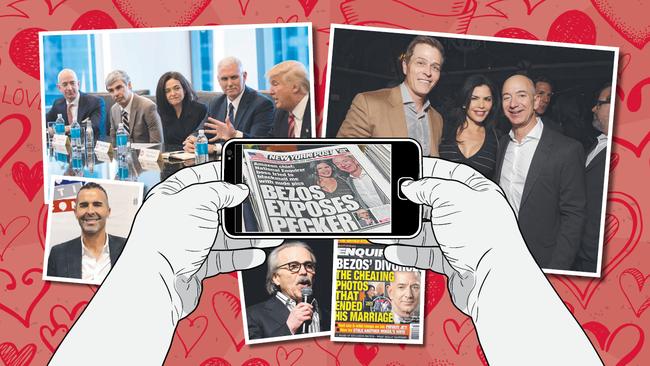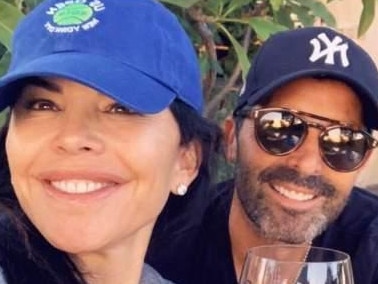Jeff Bezos and the battle of the sexts
The Bezos affair exposes bad blood between some of the most powerful men in the world.

Amazon.com Inc founder Jeff Bezos and his allies have publicly speculated about how the National Enquirer acquired racy texts he sent to his girlfriend, including at one point hinting Saudi Arabia or the White House may have been involved.
The reality is simpler: Michael Sanchez, the brother of Bezos’s lover, sold the billionaire’s secrets for $200,000 to the Enquirer’s publisher, said people familiar with the matter.
The inside story of the deal between American Media and Sanchez, brother of Lauren Sanchez, answers many of the central questions in a high-profile fight between America’s best-known tabloid and the world’s richest man, including how the Enquirer obtained Bezos’s texts and photos, for how much and why the spat became so bitter and public.
Michael Sanchez said he didn’t want to “dignify” the Journal’s reporting on the contract he struck. He described the reporting on the contract as “old rumours” from anonymous sources. Michael Sanchez denied sending “the many penis selfies” but declined to comment on whether he provided photos of Bezos to the Enquirer.
A spokesman for Bezos declined to comment. Lauren Sanchez didn’t respond to requests for comment.
The deal caused arguments at American Media before the Enquirer published its January story about the affair, sources said. A blow-up in a restaurant between American Media chief executive David Pecker and his general counsel for media led the lawyer to leave the publisher immediately.
The Enquirer approached the Amazon chief for comment on January 7, according to people familiar with the matter. Two days later, Bezos tweeted that he and his wife MacKenzie were splitting up after 25 years.
The Enquirer’s next print edition wasn’t scheduled for publication for several days, and its editors rushed the Bezos story online that night and into print with a headline: “BEZOS’ DIVORCE! THE CHEATING PHOTOS THAT ENDED HIS MARRIAGE.”
The full details of the deal and the resulting drama inside the tabloid publisher haven’t been previously reported. In February, the Daily Beast reported Michael Sanchez had leaked the Bezos texts to the Enquirer. Pecker declined to be interviewed.
Inside drama
Michael Sanchez, a talent agent who has managed television pundits and reality-show judges, has long been a source for the Enquirer and its top editor, Dylan Howard, people familiar with the matter said. He has supported President Donald Trump on Twitter and has ties to conservative activists.
Michael Sanchez began conversations last fall with the tabloid about his sister’s relationship with Bezos. The Enquirer by then had already been investigating whether Bezos and Lauren Sanchez were having an affair.
Lauren Sanchez, a former television reporter who started an aerial film production company, was introduced to Bezos by her husband, Hollywood talent-agent executive Patrick Whitesell. Whitesell is executive chairman at talent agency William Morris Endeavor Entertainment, whose chief executive, Ari Emanuel, is close with Pecker. Bezos and Lauren Sanchez worked together on some projects and began a relationship last year, a source said. She and her husband are separated.
As the tabloid publisher began negotiations to buy the materials from Michael Sanchez in October, Pecker expressed reservations about publishing a story. He was concerned Bezos would sue, forcing debt-laden American Media to expend resources to defend itself for a story executives believed was unlikely to sell well on newsstands.
While splashing a story about Bezos’s affair would burnish the Enquirer’s reputation for breaking news, its readers are historically more interested in showbiz celebrity scandals.
Pecker was told by one of his advisers that publishing the story might make it appear he was doing so on behalf of Trump, who has criticised Bezos in connection with The Washington Post’s coverage of his administration, one source said.
Pecker and Trump have known each other for more than 20 years. Federal prosecutors in New York alleged Pecker in August 2015 told Trump he would use his publications to aid Trump’s nascent presidential campaign.
American Media has been in the spotlight since it admitted to making a hush payment on behalf of Trump. The publisher last year reached a non-prosecution agreement with the US Attorney’s office in Manhattan, admitting it paid $150,000 in 2016 to a former Playboy model to suppress her story of an affair with Trump a decade earlier, using a tactic known as “catch and kill”. Trump has denied the affair. Trump has said he had no knowledge of the Enquirer’s investigation of Bezos.
Risky timing
The pursuit of the Bezos story came in a period of financial strain for the company. Efforts to refinance more than $US400 million in debt in the early autumn were jeopardised when an underwriter backed out in the wake of America Media’s legal entanglement in the hush-money case, said a person familiar with the company’s finances.
The outcome of the crucial refinancing remained uncertain as Pecker weighed whether to proceed with the explosive story.
During past refinancings, Pecker had barred American Media publications from acquiring controversial content or stories that could have imperilled the reshuffling of American Media’s debt, said someone familiar with internal discussions at the publisher.
Despite his qualms, Pecker approved the $200,000 deal with Michael Sanchez negotiated by American Media’s chief content officer, Howard; its general counsel for media, Cameron Stracher; and others, said people familiar with the contract. The amount — higher than the company typically pays sources — reflected the significance American Media placed on Michael Sanchez’s information. In most cases, the company’s source agreements require it to pay for information on publication. If a story is never published, American Media doesn’t have to pay. By contrast, the contract with Michael Sanchez stipulated he was to be paid upfront, regardless of whether any story was published, sources said.

In light of the recently concluded government investigation, Stracher, the general counsel, inserted an unusual provision into the October 26 contract with Michael Sanchez to make it clear the deal wasn’t a “catch and kill”.
If American Media didn’t publish anything within about a month, Michael Sanchez could sell the information to another outlet and keep the money. The provision stemmed from concern by American Media employees that Pecker would buy the story and suppress it because of his relationship with Emanuel, whose partner is married to Lauren Sanchez, sources said.
Pecker’s relationship with Emanuel had no bearing on the publisher’s decision-making, sources said. A spokesman for Emanuel said the talent agent had no discussions with Pecker about the Bezos story before it was published.
As early as October, the Enquirer was trailing Bezos and Lauren Sanchez to restaurants and hotels and photographing them together, the publication reported. Michael Sanchez signed the contract with American Media that month, after a few weeks of negotiations.
On November 7, Stracher and Pecker went to lunch at Cipriani Wall Street, a restaurant near American Media’s offices. Stracher, a media-law specialist who had worked for the company for 11 years, had been interested in expanding his role at American Media and believed going into the lunch Pecker was going to offer him a promotion.
As they began their meal, Pecker launched into a discussion of the Sanchez contract. Raising his voice and cursing, Pecker told Stracher he had been unaware Michael Sanchez had been paid upfront. Pecker said the company didn’t pay sources upfront and demanded to know why Stracher hadn’t shown him the contract.
Stracher replied American Media did pay upfront, albeit infrequently, and he routinely dealt with Howard on contracts. Pecker told Stracher if he was unhappy, he could quit.
Stracher, taking Pecker up on the suggestion, walked out of the restaurant. By the time he returned to American Media’s offices, less than a 10-minute walk, his keycard had been deactivated.
The Wall Street Journal couldn’t determine whether anyone at American Media briefed Pecker on the contract’s specifics before it completed the deal with Michael Sanchez.
People close to Pecker said he wasn’t aware the payment was made upfront and felt as if he was being forced to run the story.
American Media paid Michael Sanchez about a week after the lunch, said people familiar with the deal. By January, after a review of the Enquirer’s reporting by an outside law firm, Pecker tentatively approved publication of the story. American Media’s refinancing was finally settled on January 3.
The Enquirer’s 11-page spread on Bezos’s affair featured pictures of Bezos and Lauren Sanchez together, and quotes from his sexually charged text messages. Bezos’s security consultant, Gavin de Becker, investigated how American Media had obtained his electronic communications, including whether he had been hacked, and whether its reporting was politically motivated.
Amid reports on alleged links between the Enquirer story and Pecker’s actions on behalf of Trump during the 2016 election, American Media’s financial backers at Chatham Asset Management, unhappy about the Bezos coverage, conveyed their displeasure and pressured Pecker to resolve the matter, sources said. Pecker pressured his staff to do the same.
Trump’s mischief
Trump fuelled the idea the Enquirer had a political agenda, tweeting on January 13: “So sorry to hear the news about Jeff Bozo being taken down by a competitor whose reporting, I understand, is far more accurate than the reporting in his lobbyist newspaper, the Amazon Washington Post.”
In early February, an American Media employee informed Bezos’s camp Pecker was “apoplectic” about Bezos’s investigation. Bezos’s representatives soon received what they viewed as a verbal threat: The Enquirer would publish more text messages and pictures if he didn’t stop his investigation, Bezos wrote.
That was followed by an email to de Becker’s lawyer from Howard, telling Bezos in graphic terms of the unpublished material he said the Enquirer held. An American Media lawyer, Jon Fine, emailed proposing a confidential settlement. If Bezos made a statement he had no evidence politics played a role in the Enquirer story and stopped suggesting it had, the tabloid would withhold the rest of Bezos’s communications and images, Fine wrote.
In a post on online publishing platform Medium titled “No thank you, Mr Pecker”, Bezos rejected the offer and published the communications sent by American Media, including Howard’s descriptions of his erotic pictures, stirring a new debate over whether the Enquirer tried to blackmail him.
Bezos in the blog post also raised Pecker’s past use of the tabloid to aid Trump and the executive’s unsuccessful wooing of Saudi investors for an investment in 2017, further fuelling the idea the tabloid had engaged in a political attack. “If in my position I can’t stand up to this kind of extortion, how many people can?” Bezos wrote.
American Media’s internal investigation, by an outside law firm, is continuing.
The Wall Street Journal
